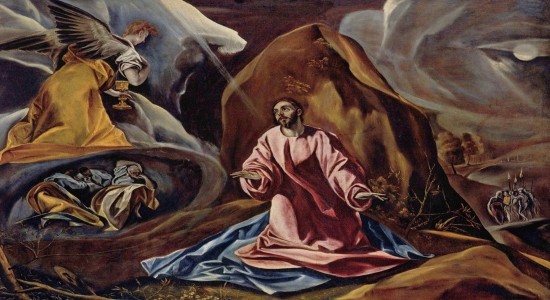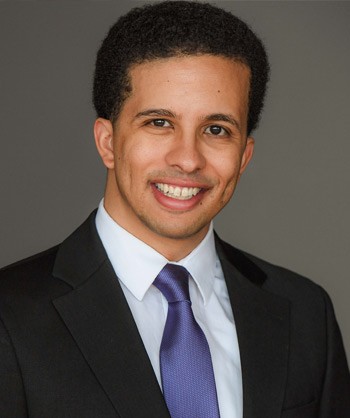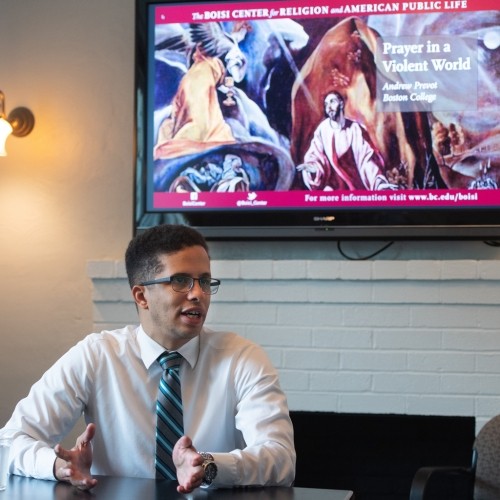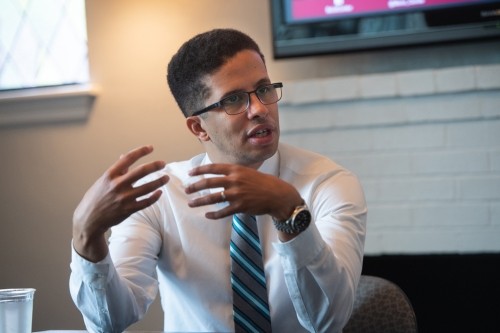Prayer in a Violent World

Andrew Prevot
Boston College
Date: September 25, 2018
Location: Boisi Center, 24 Quincy Road
Abstract
One prays to God to make the violence cease, and nothing seems to happen. Prayers have been on the lips of crusaders, slaveholders, gangsters, suicide bombers, presidents, and predatory priests, and the fact that they pray does not forestall their violent behavior. Predictable calls for “thoughts and prayers” in response to violent events ring hollow, since clearly what is needed is meaningful, collective action. Is prayer, then, irrelevant to the task of resisting violence or, worse still, a mere instrument of violence? In his lecture, Prevot will propose a method of understanding the true nature of prayer that prioritizes the prayers of victims and the prayers of those who are working to bring about peace and justice. His talk will emphasize ways that prayer allows suffering to speak, encourages critical self-examination and moral formation, and strengthens one for political struggle. His lecture will also insist that one must think rigorously about the implications of praying to a just and loving God in order to avoid the many forms of violent performative contradiction that all-too-often bedevil the practice of prayer. Prevot does not rule out the possibility that God may hear and answer, but this will not happen if our "hands are full of blood" (Isaiah 1:15).
Speaker Bio

Andrew Prevot is associate professor of theology at Boston College who writes and teaches at the intersection of spiritual, mystical, systematic, and liberation theologies; phenomenology; and continental philosophies of religion. Recent publications include, Thinking Prayer: Theology and Spirituality Amid the Crises of Modernity (University of Notre Dame Press, 2015) and “Ignacio Ellacuría and Enrique Dussel: On the Contributions of Phenomenology to Liberation Theology” which appeared in A Grammar of Justice: The Legacy of Ignacio Ellacuría, edited by. J. Matthew Ashley and Kevin Burke (Orbis, 2014). Prevot has a new book entitled Theology and Race: Black and Womanist Traditions in the United States (Brill, 2018) expected July 2018. He earned his B.A. from Colorado College and his Ph.D. from the University of Notre Dame.
Event Photos

Andrew Prevot, associate professor of theology at Boston College, speaks about the practice and necessity of prayer in a violent world.

Photos by MTS Photography
Event Recap
On Tuesday, September 25th, the Boisi Center hosted Andrew Prevot, Boston College Associate Professor of Theology, for a luncheon colloquium on “Prayer in a Violent World”. Based on his first publication, Thinking Prayer: Theology and Spirituality Amid the Crisis of Modernity (South Bend, IN: Notre Dame Press, 2015), Prevot deconstructed the concern that prayer causes more harm than good and perpetuates violence against others, arguing instead that prayer can play a powerful role in opposition to violence.
Prevot began his presentation by outlining the most common objections to prayer. A basic argument against prayer is that it does not prevent violence from occurring. Prevot noted, however, a stronger grievance in opposition to prayer: claims that it is an “instrument” that directly causes violence or encourages perpetrators to do so. Prevot outlined several possible reasons for holding these arguments. First, praying may induce greater victimization, especially when the victim feels that God is not listening. Second, many perpetrators of violence pray and are yet responsible for horrendous acts against humanity, sometimes crediting that act to prayer or God’s will, as in modern religious violence. Finally, many people view prayer as not producing, or even as inhibiting, tangible action and change to combat violence, as with the call for “thoughts and prayers” in response to American gun violence. This call is often unaccompanied by meaningful steps to address the problem.
In response to these objections, Prevot presented two ways that prayer plays a role against violence: victims often rely on prayer as a refuge, and prayer can be essential in the shaping of moral character. Many European Jews, for instance, held onto prayer in the midst of suffering in concentration camps, prayer playing a critical role in providing hope and comfort to those otherwise left bereft of recourse. Prayer has been known to play a critical role in shaping the moral character of major actors in liberation movements across the world. Martin Luther King Jr., Dorothy Day, and Dietrich Bonhoeffer have all famously attributed their perseverance and desire for justice to experiences in prayer. Prevot concluded that one way to begin to make a tangible difference against violence in the modern world is to cultivate a prayerful state of mind; one not absent of the desire for change, nor ignorant of the potential harms of prayer, but is instead a “thinking prayer”.
Read More
Books
Brackley, Dean. The Call to Discernment in Troubled Times: New Perspectives on the Transformative Wisdom of Ignatius of Loyola. New York: Crossword, 2004.
Coakley, Sarah. God, Sexuality, and the Self. Cambridge, UK: Cambridge University Press, 2013.
Cone, James. God of the Oppressed. New York: Seabury Press, 1975.
Day, Dorothy. The Long Loneliness. San Francisco: Harper and Row, 1981.
Gutierrez, Gustavo. On Job: God-Talk and the Suffering of the Innocent. Maryknoll, NY: Orbis, 1987.
Laird, Martin. Into the Silent Land: A Guide to the Christian Practice of Contemplation. Oxford, New York: Oxford University Press, 2006.
Metz, Johann Baptist and Karl Rahner. The Courage to Pray. Trans. Sarah O'Brien Twohig. New York: Crossword, 1981.
Prevot, Andrew. Thinking Prayer: Theology and Spirituality Amid the Crises of Modernity. Notre Dame, IN: University of Notre Dame Press, 2015.
Townes, Emilie. In a Blaze of Glory: Womanist Spirituality as Social Witness. Nashville: Abingdon Press. 1995.
Articles
Bade, Mary K., and Cook, Stephen W. 2008. “Functions of Christian Prayer in the Coping Process.” Journal for the Scientific Study of Religion. https://doi.org/10.1111/j.1468-5906.2008.00396.x
Clanton, J. Caleb. "George Santayana and the Problem of Petitionary Prayer." American Journal of Theology & Philosophy 35, no. 2 (2014): 108-28. https://www-jstor-org.proxy.bc.edu/stable/10.5406/amerjtheophil.35.2.0108
Danaher, James. "Contemplative Prayer & the 21st Century." New Blackfriars, vol. 93 (1046), July 2012, 446-456.
Hanek, Kate J. et al. “Political Orientation and the Psychology of Christian Prayer: How Conservatives and Liberals Pray.” The International Journal for the Psychology of Religion 21, no. 1 (2011). https://doi.org/10.1080/10508619.2011.532445
Robinette, Brian D. "The difference nothing makes: creatio ex nihilo, resurrection, and divine gratuity." Theological Studies, vol. 72, no. 3 (2011).
Other
Egan, Timothy. “No More Thoughts and Prayers,” The New York Times, December 4, 2015.
Leibovich, Mark. “Do Politicians’ ‘Thoughts and Prayers’ Mean Anything?” The New York Times Magazine, October 13, 2015.
Willingham, AJ. “How 'thoughts and prayers' went from common condolence to cynical meme,” CNN, May 19, 2018.
In the News
According to a September 2018 New York Times article, Pope Francis declared in a homily that when confronted with conflict, the best response is “silence and prayer.” This calls into question what a proper Catholic response should be regarding such controversial issues as sex abuse and gun violence.

